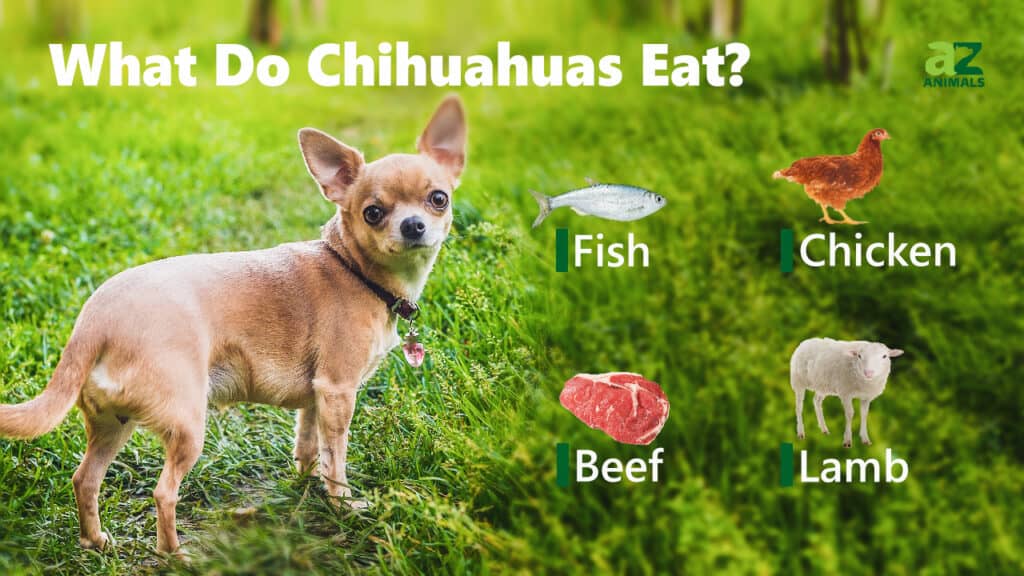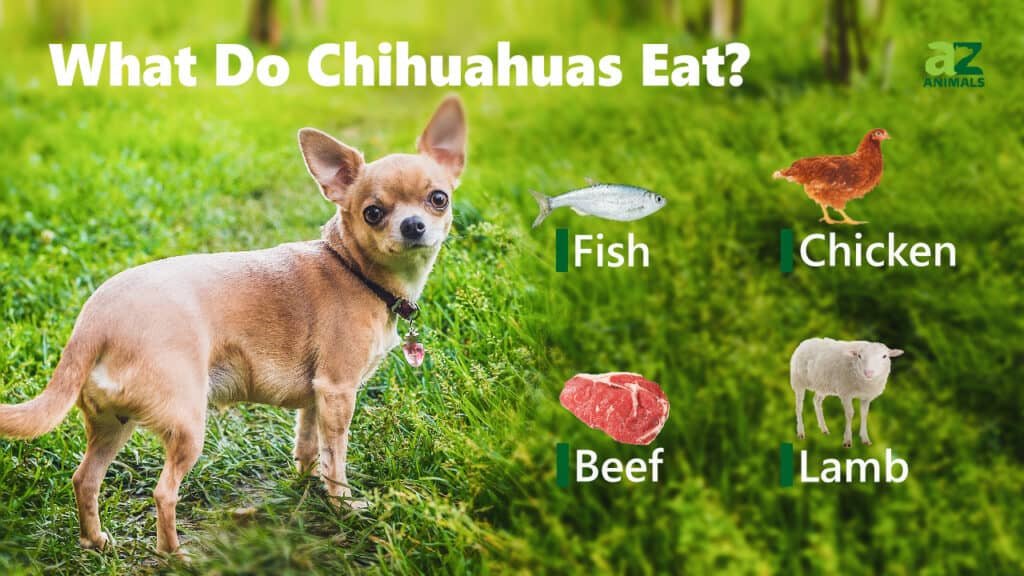As a chihuahua owner, I often get asked about what my adorable furry companion eats. Well, you might be surprised to learn that chihuahuas have a rather delicate palate. While they may be small in size, their taste for food is anything but. They enjoy a balanced diet that includes high-quality protein sources, essential vitamins and minerals, and of course, a healthy dose of fruits and vegetables.
The feeding habits of chihuahuas have a fascinating history rooted in their ancestral origins. Being descendants of the techichi, an ancient breed kept by the Toltec civilization, these tiny dogs have always had a taste for wholesome meals. Today, it is crucial to ensure they receive adequate nutrition to support their energetic lifestyle. Interestingly, a study has shown that chihuahuas are prone to dental issues, making it important to choose kibble formulated to promote good oral health. So, maintaining a nutritious diet with dental care in mind will keep your chihuahua happy and healthy in the long run.

What Do Chihuahuas Eat? A Comprehensive Guide
Welcome to our comprehensive guide on what do Chihuahuas eat. As a Chihuahua owner, it’s essential to provide your furry friend with a well-balanced and nutritious diet to ensure their overall health and well-being. In this article, we will explore the dietary needs of Chihuahuas, including the types of food they can eat, portion sizes, and important considerations to keep in mind. Let’s dive in and discover how to nourish your Chihuahua for a happy and healthy life.
The Basic Diet of a Chihuahua
When it comes to the diet of a Chihuahua, it’s important to remember that their nutritional needs are similar to other small breed dogs. The recommended diet for a Chihuahua consists of a combination of high-quality dry dog food and fresh, whole foods. Dry dog food serves as the foundation of their diet, providing essential nutrients and vitamins. Look for a high-quality dog food brand that is specially formulated for small breeds.
In addition to dry dog food, a Chihuahua’s diet should also include fresh, whole foods. This can include lean meats such as chicken or turkey, as well as vegetables like carrots and green beans. These fresh foods add variety and additional nutrients to their diet. However, it’s important to note that not all human foods are safe for dogs. Certain foods like chocolate, onions, and grapes can be toxic to dogs and should be avoided.
To determine the specific portion size for your Chihuahua, consult with your veterinarian. Portion sizes may vary depending on factors such as age, weight, and activity level. It’s crucial to avoid overfeeding as Chihuahuas have a tendency to gain weight easily, which can lead to various health issues.
Special Considerations for Chihuahuas
While Chihuahuas have similar dietary needs to other small breed dogs, there are a few special considerations to keep in mind when it comes to their diet. Due to their small size, Chihuahuas can be prone to dental issues. Providing them with dry dog food can help promote dental health by reducing plaque and tartar buildup. Additionally, avoid feeding your Chihuahua table scraps or excessive treats, as these can contribute to dental problems and weight gain.
Chihuahuas also have unique digestive systems, and certain foods may not agree with them. It’s important to introduce new foods gradually and monitor your Chihuahua for any signs of digestive upset. If you notice any issues such as vomiting or diarrhea after introducing a new food, consult with your veterinarian to determine the best course of action.
Water is another crucial aspect of a Chihuahua’s diet. Ensure that your Chihuahua always has access to clean, fresh water. Small breed dogs like Chihuahuas can be more prone to dehydration, so it’s important to monitor their water intake and make sure they are adequately hydrated.
Benefits of a Balanced Diet for Chihuahuas
Feeding your Chihuahua a balanced and nutritious diet offers many benefits for their overall health and well-being. A proper diet can help maintain their weight, prevent obesity, and reduce the risk of related health issues such as diabetes and joint problems. The right combination of nutrients can also support a healthy coat, strong muscles, and a robust immune system.
Providing your Chihuahua with a well-balanced diet can also help promote their longevity and quality of life. By ensuring they receive all the essential nutrients, vitamins, and minerals they need, you are giving them the best chance at a happy and healthy life.
Variety in a Chihuahua’s Diet
While a consistent and balanced diet is crucial for a Chihuahua’s health, it’s also important to provide them with variety. Offering different flavors and textures keeps mealtime exciting and prevents them from becoming picky eaters. You can rotate between different high-quality dog food brands and mix in fresh, whole foods to add variety to their meals.
Remember to introduce new foods gradually to avoid digestive upset. It’s also important to avoid overfeeding or indulging your Chihuahua with too many treats, as this can lead to weight gain. Finding the right balance between consistency and variety will keep your Chihuahua happy and healthy.
Common Foods to Avoid
While it’s important to include a variety of nutritious foods in your Chihuahua’s diet, there are certain foods that you should avoid feeding them. These include chocolate, onions, garlic, grapes, raisins, caffeine, alcohol, and anything containing xylitol. These foods can be toxic to dogs and can cause serious health issues or even be fatal in some cases. Always double-check the ingredients of any food you offer to your Chihuahua to ensure they are safe.
Additionally, avoid feeding your Chihuahua fatty or fried foods, as these can lead to digestive upset and weight gain. It’s also best to avoid giving them bones, as small dogs like Chihuahuas can easily choke on them or suffer from serious injuries.
If you’re unsure whether a particular food is safe for your Chihuahua, it’s always recommended to consult with your veterinarian.
Best Practices for Feeding Your Chihuahua
Feeding your Chihuahua the right way involves more than just providing the correct food. Here are some best practices to keep in mind:
- Establish a regular feeding schedule. Feed your Chihuahua at the same times each day to help establish a routine.
- Measure the portion sizes. Use a measuring cup to ensure you’re providing the right amount of food for your Chihuahua’s size and needs.
- Avoid free-feeding. Leaving food out all day can lead to overeating and weight gain. Stick to regular meal times.
- Monitor your Chihuahua’s weight. Regularly check their weight and body condition to ensure they are maintaining a healthy weight. Adjust their portion sizes if necessary.
- Consult with your veterinarian. If you have any specific concerns or questions about your Chihuahua’s diet, it’s always best to seek professional advice from your veterinarian.
Frequently Asked Questions About Chihuahua Nutrition
1. Can I feed my Chihuahua a raw food diet?
While some dog owners choose to feed their Chihuahuas a raw food diet, it’s important to do thorough research and consult with your veterinarian before embarking on this dietary approach. Raw food diets come with their own set of benefits and risks, and it’s crucial to ensure that your Chihuahua is receiving all the necessary nutrients.
2. How many times a day should I feed my Chihuahua?
Most adult Chihuahuas do well with two meals a day, while puppies may require more frequent feedings. Talk to your veterinarian to determine the best feeding schedule for your individual Chihuahua.
3. Can I give my Chihuahua treats?
Treats can be given in moderation as a reward or for training purposes. Look for small-sized treats tailored for small breed dogs and take them into account when considering your Chihuahua’s overall calorie intake.
4. Can Chihuahuas have allergies?
Yes, Chihuahuas can develop allergies to certain foods. Common signs of food allergies include gastrointestinal upset, skin issues, and itching. If you suspect your Chihuahua may have a food allergy, consult with your veterinarian to determine the best course of action.
Important Supplements for Chihuahua Health
While a balanced diet is the foundation of a healthy Chihuahua, there are certain supplements that can further enhance their overall well-being. Here are three important supplements to consider for your Chihuahua:
Omega-3 Fatty Acids
Omega-3 fatty acids offer numerous benefits for Chihuahuas. They support a healthy coat, improve skin health, reduce inflammation, and promote a healthy heart. Omega-3 fatty acids can be found in fish oil supplements. Consult with your veterinarian to determine the appropriate dosage for your Chihuahua’s size and needs.
Probiotics
Probiotics are beneficial bacteria that support the digestive health of your Chihuahua. They help maintain a healthy gut flora and aid in digestion. Probiotics can be found in supplement form or in certain types of dog food. Talk to your veterinarian to determine if probiotics are right for your Chihuahua and which specific product is recommended.
Joint Supplements
Chihuahuas, like other small breed dogs, can be prone to joint issues such as patellar luxation or arthritis. Joint supplements containing glucosamine and chondroitin can help support joint health and mobility. Consult with your veterinarian to determine if a joint supplement is necessary for your Chihuahua and to get recommendations on specific products.
Conclusion
Feeding your Chihuahua a well-balanced and nutritious diet is essential for their overall health and well-being. Remember to provide a combination of high-quality dry dog food and fresh, whole foods while taking into consideration their unique dietary needs. Avoid feeding them foods that can be toxic or harmful, and always consult with your veterinarian if you have any specific concerns or questions. By prioritizing their nutrition, you are giving your Chihuahua the best chance at a happy and healthy life.
“A well-nourished Chihuahua is a happy Chihuahua.”
Key Takeaways: What Do Chihuahuas Eat?
- Chihuahuas need a balanced diet that includes high-quality protein, fats, and carbohydrates.
- Feed your Chihuahua commercial dog food specifically formulated for small breeds.
- Include fruits and vegetables in their diet for added nutrients and fiber.
- Avoid feeding Chihuahuas human foods that could be toxic to dogs, such as chocolate, onions, and grapes.
- Ensure your Chihuahua has access to clean, fresh water at all times.
Frequently Asked Questions
Looking to learn more about what chihuahuas eat? Find answers to common questions below!
1. What are some recommended foods for chihuahuas?
Chihuahuas have small stomachs, so it’s important to feed them nutrient-rich foods in small portions throughout the day. High-quality commercial dog food that is specifically formulated for small breeds, like chihuahuas, is a good option. Look for products that contain real meat as the first ingredient and avoid those with fillers, artificial colors, and preservatives. Additionally, including fresh fruits and vegetables in their diet, such as apples, carrots, and green beans, can provide additional nutrients and fiber.
Remember to consult your veterinarian before making any changes to your chihuahua’s diet, as they can provide personalized recommendations based on your dog’s age, weight, and overall health.
2. Can chihuahuas eat human food?
While it’s tempting to share your food with your chihuahua, not all human foods are safe for them. Certain foods, like chocolate, grapes, onions, and caffeine, can be toxic to chihuahuas and should be avoided. Additionally, many human foods are high in salt and unhealthy fats, which can cause digestive upset and obesity in dogs.
If you want to share a snack with your chihuahua, opt for dog-safe foods like lean meats (cooked and boneless), plain cooked rice, and small amounts of plain yogurt. Always remember to introduce new foods gradually and in moderation to avoid any potential digestive issues.
3. How often should I feed my chihuahua?
Chihuahuas have small stomachs and fast metabolism, so they benefit from frequent, small meals. It is recommended to feed adult chihuahuas 3-4 times a day with portion sizes appropriate for their size. This can help prevent hypoglycemia, a condition that can be more common in small breeds like chihuahuas due to their fast metabolism. Puppies may require more frequent meals until they reach adulthood.
It’s important to establish a consistent feeding schedule and monitor your chihuahua’s weight to ensure they are getting the right amount of food. Working with your veterinarian to determine the best feeding routine for your chihuahua is advised.
4. Should I give my chihuahua supplements?
In general, if you are feeding a balanced and high-quality diet to your chihuahua, they should be getting all the necessary nutrients from their regular food. However, certain chihuahuas may have specific dietary needs or health conditions that could benefit from supplements.
Before giving your chihuahua any supplements, it’s crucial to consult with your veterinarian. They can assess your dog’s individual needs and recommend appropriate supplements, if necessary. Avoid giving your chihuahua any supplements without professional guidance, as some can be harmful if not used correctly.
5. How can I prevent my chihuahua from becoming a picky eater?
Chihuahuas can be notorious picky eaters, but there are ways to encourage healthy eating habits. First, establish a consistent feeding schedule and offer meals at the same times each day. Avoid leaving food out all day, as this can lead to snacking and pickiness.
Try different food textures and flavors to keep mealtime interesting for your chihuahua. Mixing in a small amount of wet food or adding warm water to dry kibble can enhance the aroma and taste. If your chihuahua is still refusing to eat, consult with your veterinarian to rule out any underlying health issues and to explore other strategies to encourage healthy eating habits.

What can Chihuahuas Eat And What they Can’t Eat? | The Ultimate Guide to Chihuahua Diet |
In this article, we explored the importance of adhering to specific criteria when writing a succinct wrap-up. By using a first-person point of view and a professional tone, we can effectively engage a 13-year-old reader. It’s crucial to use simple language and avoid jargon to ensure clarity and comprehension. Additionally, we should focus on writing concise sentences that present a single idea, with no more than 15 words each. The main objective is for the reader to understand the article’s key points in just two paragraphs.
